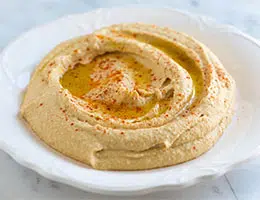 The notion of humus has two broad meanings recognized by the Royal Spanish Academy ( RAE ). The term can be used to refer to the mixture of organic compounds that is created from the decomposition of vegetables and animal remains , or to a chickpea paste that is traditional in Arab cuisine.
The notion of humus has two broad meanings recognized by the Royal Spanish Academy ( RAE ). The term can be used to refer to the mixture of organic compounds that is created from the decomposition of vegetables and animal remains , or to a chickpea paste that is traditional in Arab cuisine.
In the first case, humus is a substance that arises when various organic elements are decomposed by bacteria , fungi or other organisms. Dark in color due to the high level of carbon it presents, humus is located in the upper layers of the soil.
Most of the humus is vegetal, while the soil, in its depth, has mineral origin. Decomposing leaves , roots, stems, pollen and seeds; the substances exuded by plants; and the remains of dead animals are part of the humus.
Humus can be destroyed by the use of chemical fertilizers, overgrazing, deforestation and tillage. When the soil runs out of this substance, it directly suffers the consequences of erosion and tends to be exhausted.
As for hummus as a gastronomic preparation, it is a chickpea puree generally combined with lemon juice, olive oil, garlic and sesame cream . In this case, the concept is usually written with two Ms ( hummus ).
Paprika can be added to hummus or hummus when served. Popular in countries such as Lebanon , Syria , Armenia , Israel and Turkey , it is usually served cold with fresh vegetables or with pita bread.
One of the advantages of hummus is its easy preparation : it is not necessary to have a lot of cooking experience to make it, nor to have great skill. As if this were not enough, the ingredients are not expensive or difficult to find, and in fact everyone can create their own version of hummus, taking advantage of the products they have at home.
 Whether we prepare it to accompany another dish or to snack on between meals, hummus can be a delicious food , ideal for spreading on bread, toast or cookies, among other dough-based products, but it can also be used as a salad sauce. In short, it has great versatility, even more than mayonnaise.
Whether we prepare it to accompany another dish or to snack on between meals, hummus can be a delicious food , ideal for spreading on bread, toast or cookies, among other dough-based products, but it can also be used as a salad sauce. In short, it has great versatility, even more than mayonnaise.
Beyond its origins and its traditional recipe, today hummus is a product enjoyed by people all over the world. For vegans it is ideal, since it does not contain any animal products and has nothing to envy of pâté, for example, although it is also possible to prepare 100% vegetable pâté.
As in any culinary recipe , a good hummus is one that has a good balance between the ingredients and the appropriate seasonings , all of them in proportions that prevent the imposition of one flavor over the others. The main ingredient, in this case, is usually chickpea puree, and this opens the doors to two possible extremes: lovers of this species of legume will surely fall in love with hummus, while others will not be able to appreciate it.
Chickpeas are generally used pre-cooked; However, there are those who leave them soaked overnight to be able to use them in a more natural way. Regarding the type of oil that we should use to prepare the hummus, sesame is recommended although it is also possible to use olive. Garlic is another of the key ingredients, since together with lemon juice they give it that spicy touch and intensify the rest of the flavors.
